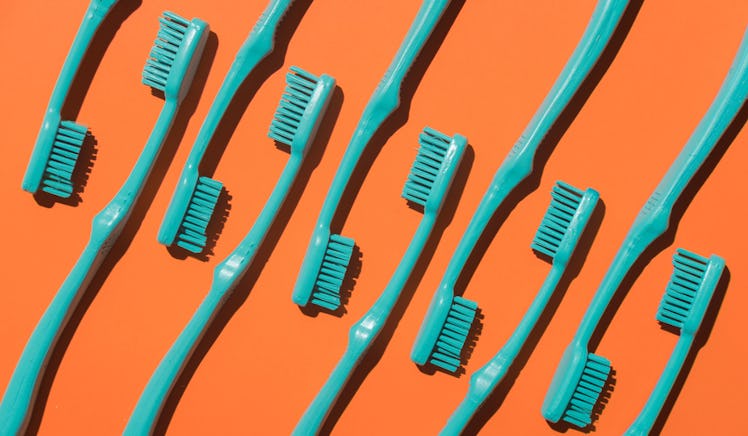
If You've Ever Shared Your Toothbrush With Someone Else, We Need To Talk About How Gross It Is
Everyone has a different set of hygiene habits they adhere to. We have the things we refuse to skip (hello, invigorating body wash), the things we try to do more of (why does flossing always feel like it takes an eternity?), and then we have the things we can't seem to get ourselves to do, no matter how often we re-learn the same information. Consider your toothbrush, for example. Yes, you probably know how often you should brush your teeth, but what about the actual maintenance of the toothbrush itself? Like, is it gross to share a toothbrush?
Yes, it most certainly is gross. But that's not the only nasty toothbrush habit that people continuously hold onto, despite learning again and again how many germs can live and grow inside of those thick bristles.
Toothbrushes are one of those things that are part of our daily hygiene routine, yet most of us consistently overlook how to properly care for and use them, which is why you might want to ask yourself if you're being as clean as you should be in regards to maintaining your own.
First, let's talk about that whole sharing-your-toothbrush-with-friends question. It's a tale as old as time: There's that cute, and at first awkward moment between couples, when one person shares their toothbrush with the other after sleeping over, and it's super adorable because you're being all intimate and vulnerable with one another, and you gaze into each other's eyes as the brush comes closer to your mouth—
Freeze. This is not a cute scenario. It's a gross one, and seriously unhygienic.
Even if you can't see them, food particles remain in a toothbrush after you clean it.
This means that you're brushing someone else's food waste into your own teeth, all the while thinking you're cleaning your teeth. But it's not just food that stays in a toothbrush long after you "wash it out" with water. There's also bacteria, which is growing in a lovely, open-vacancy environment of moisture and food debris all day long, just waiting for you to get home and put the brush back into your mouth.
It's upsetting enough to know that you're doing this with your own toothbrush. But taking foreign food particles and bacteria and inserting it inside of your mouth sounds more or less like a straight-up suicide mission for your immune system.
It's not just sharing a toothbrush that should concern you, though. Leaving a toothbrush on its side (so it lies in that puddle of toothy water) or in the shower (because you're a busy, powerful, independent woman who saves time by multitasking) is equally likely to invite some nasty bacteria into your mouth the next time you go to brush your teeth. Basically, any time you leave your toothbrush in a moist or completely wet environment, you're basically begging for bacteria to colonize in the bristles.
If you think I'm being dramatic, consider this:
One study found that approximately 60 percent of toothbrushes stored in a shared bathroom contained strains of fecal matter in the bristles.
Oh, but don't worry, it gets worse! Out of those poop-soaked brushes, 80 percent of the poop did not belong to the owner of the toothbrush.
It doesn't take a scientist to recognize what happens if you're routinely brushing your teeth with fecal matter and bacteria: You're going to increase your chances of getting sick, whether it's a flu or a more serious intestinal issue.
The good news is this: It's pretty easy to start taking better care of your toothbrush. All you have to do is be more conscious of how and where you store it (in a dry location, far, far away from a toilet) and how often you replace it.
Ideally, you should be replacing your toothbrush every three months.
If that seems daunting, just remind yourself that most toothbrushes come in packs, anyways. The world is setting you up to win with this one.
And if you're not sure about how clean your toothbrush is, or it's starting to look a little scummy, it's safest to abide by the same mantra you use with condoms and cartons of milk: When in doubt, throw it out.
Check out the entire Gen Why series and other videos on Facebook and the Bustle app across Apple TV, Roku, and Amazon Fire TV.